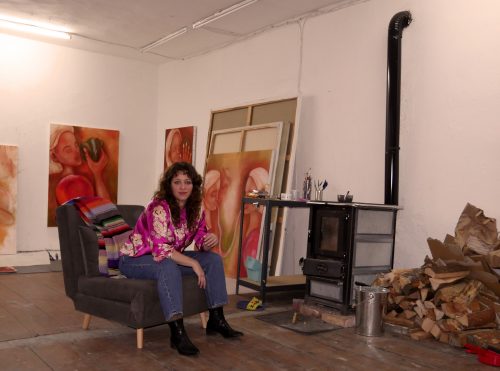
Ethel Lilienfeld, Jiří Kaňák, Viktor Dedek
I'm Sorry You Feel That Way
Project Info
- 💙 Dům pánů z Kunštátu, G99
- 💚 Barbora Trnková
- 🖤 Ethel Lilienfeld, Jiří Kaňák, Viktor Dedek
- 💜 Barbora Trnková
- 💛 Barbora Trnková a Eva Rybářová
Share on

Advertisement












The exhibition I’m Sorry You Feel That Way turns our attention from exploring the changes that digital technologies have had on our everyday reality and culture to the fact that many much-needed socio-cultural changes are being prevented. As we view it, we go around in a circle and observe how traditional, internalized interpretations of our identity are being remediated in the technological environment of the contemporary world by exposing us to emotional manipulability.
The programming of the applications does not begin with writing a code, but with the intention projected into the design of interactivity. Emotional triggers that create dependency connections with users and manipulate them to take certain actions are key for app developers. Algorithms with implemented artificial intelligence track our online activity, analyze our emotional responses and offer personalized emotional triggers at precisely calculated intervals, with the aim of keeping us in front of our screens for as long as possible and getting us to make purchases.
It would be too simplistic to assume that simply logging off social media and turning off the computer is enough to reject this pervasive pressure. Or start treating your addiction to computer games or pathologies related to appearance. Although, of course, this is also important. Because these triggers are activated by insecurities that are often associated with injuries resulting from certain social narratives, the problems associated with digital technologies must be seen as visible forms of culturally much more deeply embedded principles.
An audiovisual installation by French-Belgian artist ETHEL LILIENFELD shows the addictive loop associated with the techno-socially amplified cult of beauty and youth. In the text for the work, she reminds us that the obsession with beauty filters is the cause of the so-called “snapchat dysmorphia” – a pathological feeling of ugliness that drives people to plastic surgery clinics to make them resemble their digitally idealized selves. This problem particularly affects women, whose value in our society is still often derived from appearance and age. This makes it easy for programmers to focus their digital tools on internalizing this pervasive social pressure. Their employers and those who do not see patriarchal structures as a problem, however, don’t feel concerned.
The denial of responsibility for how the other feels and what impact certain actions have on individuals, as well as entire groups of people, brings us to JIŘÍ KAŇÁK’s kinetic object. The student of the Academy of Fine Arts in Prague presents a robust machine that mechanically appropriates the invisible violence associated with insincere apologies and, with a simple gesture of grotesque multiplication, makes visible what would remain hidden on the smooth surface of digital technology. The title of the exhibition I’m Sorry You Feel That Way represents a manipulative strategy of avoiding guilt and implying a problem with the victim’s feelings. Since the phrase looks like an apology, the injured person not accepting it furthermore appears to be the one creating the conflict. A true apology presupposes the ability and willingness to feel guilt, and this is only possible when we also acknowledge unpleasant emotions as sources of enriching information. Which may be a bit harder for those of us who have been socialized as men in our society, because it usually involves less emphasis on the emotional domain.
VIKTOR DEDEK, who currently studies at the Zurich University of the Arts, critically explores the phenomenon of computer games in his work, which allows him a deep dive into a world where repressed emotions are sublimated on a massive, global level. Through an auto-ethnographic method, he reveals the multi-layered and intimate aspects of gamer passion as well as its problematic aspects. This degree of self-reflection, still relatively rare in the given context, is conditioned by a willingness to acknowledge them and an inspired development of a dialogue with one’s own complex emotions and the past from which some of them spring.
This exhibition is supported by LeFresnoy - Studio national des arts contemporains
Barbora Trnková




